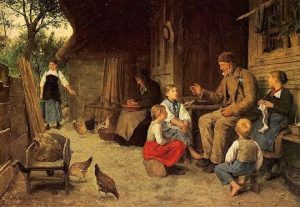Of all the stories Jews could tell about themselves, the Exodus from Egypt is the most central. Why not Creation? The Bible and the Gospel of John start there. Or monotheism? Abraham is pretty compelling a progenitor. Moses the lawgiver? He would be a great tragic hero. Or how about the national drama of King David and his dynasty? That kind of story is what most European history uses.
Other later stories could serve, too: stories of exile, persecution, inquisition or Zionism and the establishment of the State of Israel. No, from ancient times to today, the Jewish story is going from slavery to freedom.
The choice of story matters because it is what holds a large group of people together. As Yuval Noah Harari writes in his book “Sapiens: A Brief History of Humankind”:
Any large-scale human cooperation – whether a modern state, a medieval church, an ancient city, or an archaic tribe – is rooted in common myths that exist only in people’s collective imagination.

(blogs.creighton.edu.)
A common myth empowers cooperation by building bridges and borders. The myth matters because it gives purpose, regardless of its veracity. People who jointly believe in a myth will create or destroy in its name; it is that powerful.
Jews do tell those other stories aside from the Exodus. The Exodus looms larger, though. In fairness, the Exodus has a leg up because the Passover holiday commands us to commemorate it with seven days of unleavened bread and other symbolic actions. Deuteronomy 26:5-8 doubles down on the story by instructing Jews to recite the story when they bring their first fruits at the next calendrical festival of Shavuot. Even before written Passover Haggadah guides for the seder, those verses served as the memorized text of the Exodus story. No king, no prophet, not Queen Esther, not Judah Maccabee, no rabbi, no Jewish philosopher, no court Jew, no Jewish Nobel laureate, and no Israeli Prime Minister can top that deeply embedded a story. In fact, a 2017 Pew Research report indicated that the Passover seder is the most practiced Jewish holiday in Israel and the United States.
Even Moses is written out of the Haggadah, his name does not appear once in the traditional text. The ancient rabbis spend significant time imagining Moses as God’s instrument in the Exodus. They tell of how Moses inspired God to take action. Noticing the Jewish slaves’ burdens, Moses tells Pharaoh that productivity will go up if the Jews get a day off (Shabbat) and if their loads were adjusted so that each carried a weight they could bear. Moses even kills a taskmaster who would have beaten a Jewish slave to death. The rabbis say that God decided to leave God’s divine retinue because Moses left his royal retinue. God had heard the cries of the Jews’ suffering and did not take action until Moses did.
I share this focus on the Exodus story for three reasons: one, it is what Jews are reading in the liturgical cycle right now; two, we have seen the power of stories to guide human action and the need for stories that bring us together; and three, in our American search for a myth or story to heal our divides and to promote our democracy, we would do well to pick a story or stories that remind us of the preciousness of our freedom, perhaps even of the suffering of those denied it, and the keys to our prosperity coming from listening to the cries of others.
Harari notes, “Telling effective stories is not easy.” Still, I believe we can. Let us lift up what we have lost, listen to each other’s woes, and weave the fabric of a renewed sense of mutual purpose. God willing, with that purpose, we can renew our nation.
About Rabbi Jeremy Winaker
Rabbi Jeremy Winaker is the executive director of the Greater Philadelphia Hillel Network, responsible for West Chester University, Haverford, Bryn Mawr, and other area colleges. He is the former head of school at the Albert Einstein Academy in Wilmington and was the senior Jewish educator at the Kristol Hillel Center at the University of Delaware for four years. Rabbi Winaker lives in Delaware with his wife and three children.

Comments